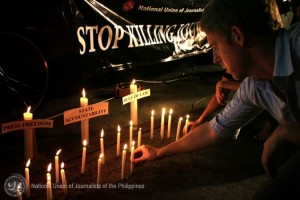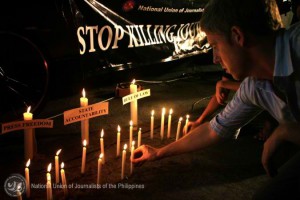By AVIGAIL OLARTE
 NEARLY a year after the Maguindanao massacre, the Aquino administration has yet to make good on its promise to disarm and disband all private armies in the country.
NEARLY a year after the Maguindanao massacre, the Aquino administration has yet to make good on its promise to disarm and disband all private armies in the country.
During a forum on the commemoration of the Nov. 23 massacre held Thursday at the University of the Philippines, Communications Group Secretary Herminio Coloma said the government has at least initially deployed resources to strengthen the Philippine National Police.
“The PNP has been directed to pursue a more resolute campaign to monitor where these armies are operating and if they are committing acts detrimental to public welfare,” he said.
Shortly after he came to power, President Benigno Aquino III vowed to abolish private armies that thrived under the Arroyo administration. This was in keeping with his other promise to bring to justice the perpetrators of the massacre.
On Nov. 23 last year, 58 people, 32 of them journalists, were abducted and murdered in Ampatuan, Maguindanao. The killings have been tagged as the worst political violence in the country’s recent history and the single deadliest event for journalists worldwide.
Police have confirmed the existence of at least 68 private armed groups with high-powered firearms, 25 of which operate in the Autonomous Region in Muslim Mindanao alone. These private armies are said to carry about 800,000 unaccounted firearms.
The Aquino administration has been repeatedly called upon to issue an executive order banning all paramilitary and militia forces in the country. But no such directive has been issued to date.
As of last May, 35 of 107 existing private armed groups had been reportedly dismantled by the military and the police. At least 130 members had been arrested and 127 firearms confiscated, according to the May 2010 report of the Zenarosa Commission.
The seven-member commission was created by President Gloria Macapagal Arroyo shortly after the massacre to investigate private armies in the country.
In its report, the commission recommended the disbanding of paramilitary forces that are not used for counterinsurgency, along with a stricter policy on possession of firearms.
While the Aquino government has not acted on these recommendations, Justice Secretary Leila De Lima said on Wednesday that the Zenarosa Commission could be reactivated to investigate the massacre that involves the powerful Ampatuan clan.
This was in response to a recent report of the Human Rights Watch (HRW), an international nongovernmental organization that conducts research and advocacy on human rights, detailing the series of human rights violations of the Ampatuans.
In its 96-page report, HRW said that one year after the massacre, “the Ampatuans remain a powerful and dangerous force with which to be reckoned.”
The situation can be described as a “blowback,” journalist Maria Ressa said during Thursday’s forum. Blowback is defined as an “unforeseen and unwanted effect or set of repercussions.”
Ressa said it was the same situation that the U.S. found itself in during its covert war against Afghanistan where a group they’ve created–like that of Osama Bin Laden’s– went out of control. The U.S. has likened it to a scientist creating a monster (Frankenstein) that “blows back” on its maker.
The Ampatuans are known allies of former President Arroyo. HRW reported that during her reign, militia forces under the Ampatuans grew considerably.
The family gained significant power in 2001 when Andal Ampatuan Sr. was elected governor. In 2007, majority of the province’s 27 mayors were sons and relatives of the patriarch; all but one ran unopposed.
During this year’s elections, just a few months after the murders, eight of 34 mayors who carry the name Ampatuan were elected to office, along with others related to the clan.
“The Arroyo government, in exchange for political support from the Ampatuans, tacitly permitted if not actually facilitated the strengthening of various militia forces,” HRW said in the report.
In the South, political clans protect their interests by employing private armies. The PNP defines private armies as “an organized group of two or more persons, with legally issued or illegally possessed firearms, utilized for purposes of sowing fear and intimidation for the advancement and protection of vested economic and/or political interests.”
Private armed groups or PAGs have been in existence since the Marcos era. After democracy was restored, the 1987 Constitution called for the dismantling of all paramilitary forces. But under the Corazon Aquino administration, state-sanctioned armed groups like the Citizen Armed Force Geographical Unit (CAFGU) were created. The CAFGUs, along with other counterinsurgency groups such as the Civilian Volunteer Groups (CVOs), allegedly committed human rights abuses.
During President Fidel V. Ramos’ time, he attempted but failed to dismantle all private armies no longer needed for anti-insurgency. In 2001, when Arroyo came to power, she strengthened the capability of such units for her “all-out war” against insurgents and supplied them thousands of firearms.
Many of these paramilitary forces are still under the control of the Ampatuan family. While they fought the war against the Moro Islamic Liberation Front and the New People’s Army, they directly reported and served under the Ampatuans.
The government’s failure to disband private armies can be partly traced to lack of regulation. HRW reported that both the police and the military denied having supervisory role over militia members, although they are supposedly working with authorities.
But Coloma said all sectors should work together to put an end to warlordism. He said citizens should help bring to light allegations of crimes committed by submitting specific and concrete reports to authorities.
HRW has called on the president, police, military, justice department and the Commission on Human Rights to ban and disarm all paramilitary and militia forces, cut private funding to such groups, control the issuance and procurement of arms, investigate the abuses of militia forces and the involvement of the police and the military, and ensure the safety of survivors, witnesses, and families of victims.
The international human rights group quoted an academic in its report: “Warlordism exists because it has blessing from the top.”
